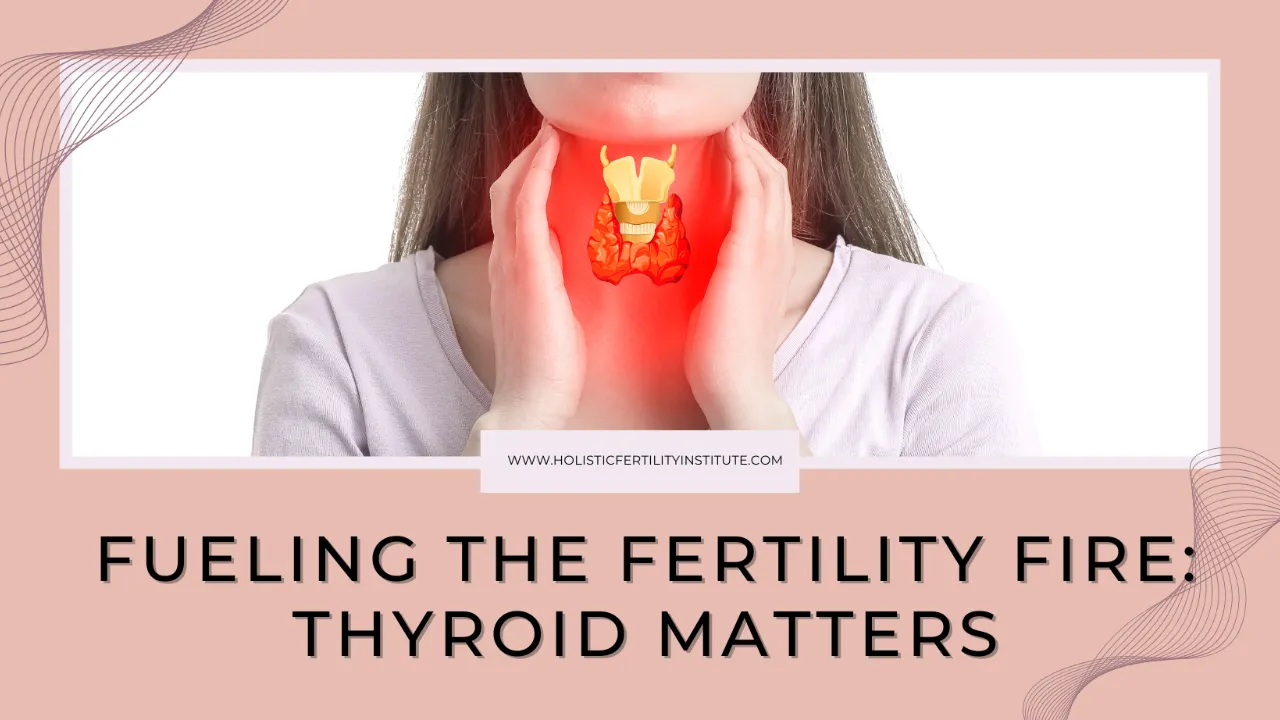What is a healthy thyroid doing? The thyroid gland is a small, butterfly-shaped gland located in the front of the neck. The thyroid gland produces and releases thyroid hormones, primarily thyroxine (T4) and a lesser amount of triiodothyronine (T3), into the bloodstream. These hormones play a crucial role in regulating various bodily functions and metabolism.
Thyroid hormones help regulate hormone production, metabolism, (how fast your body turns food into energy), heart and digestive functions, muscle control, brain development, and bone maintenance.
Disruptions in thyroid function can lead to various thyroid disorders, such as hypothyroidism (underactive thyroid) or hyperthyroidism (overactive thyroid). These conditions can result in a range of symptoms and health implications, including fertility challenges.
Why is thyroid function crucial to fertility?
Thyroid function is crucial to fertility because thyroid hormones play a significant role in regulating the reproductive system in both men and women. Here's why thyroid function is important for fertility:
- Menstrual cycle regulation: Thyroid hormones help regulate the menstrual cycle in women. Imbalances in thyroid function, such as hypothyroidism or hyperthyroidism, can disrupt the normal hormonal fluctuations necessary for ovulation and menstruation. Irregular or absent menstrual periods can affect a woman's fertility by making it difficult to determine the fertile window for conception (or by not having one at all, if ovulation is impaired).
- Ovulation: Thyroid hormones influence the maturation and release of eggs from the ovaries during ovulation. Inadequate levels of thyroid hormones can disrupt this process, leading to irregular or anovulatory cycles.
- Hormone production: Thyroid hormones interact with other reproductive hormones, such as follicle-stimulating hormone (FSH) and luteinizing hormone (LH), which are essential for follicle development, egg maturation, and the release of the egg from the ovary. Imbalances in thyroid function can interfere with the production and regulation of these hormones, affecting the timing and quality of ovulation.
- Implantation and early pregnancy: Optimal thyroid function is crucial for the successful implantation of a fertilized embryo in the uterus and early pregnancy development. Thyroid hormones help create a favorable environment in the uterus for implantation and support the growth and development of the embryo. Inadequate thyroid function during early pregnancy can increase the risk of miscarriage or other pregnancy complications.
- Sperm production: Thyroid hormones also play a role in male fertility. Imbalances in thyroid function can affect sperm production, motility, and overall sperm quality, potentially leading to reduced fertility.
Studies show that thyroid function is crucial to fertility health.
There have been numerous studies conducted to examine the relationship between thyroid function and fertility. Here are a few notable studies that highlight the importance of thyroid function in fertility:
- "Thyroid autoimmunity and reproductive function" (Journal of Endocrinological Investigation, 2011)
- This study found that women with thyroid autoimmunity (specifically, autoimmune thyroiditis or Hashimoto's thyroiditis) had a higher prevalence of infertility and miscarriages compared to women without thyroid autoimmunity. It suggests that thyroid autoimmunity may negatively impact reproductive function.
- "Thyroid function and reproductive health in men and women" (Frontiers in Endocrinology, 2018)
- This review article analyzed various studies on the association between thyroid function and reproductive health in both men and women. It concluded that thyroid disorders, including both hypothyroidism and hyperthyroidism, can affect fertility in women and men. It emphasized the importance of evaluating thyroid function in individuals experiencing fertility problems.
- "Thyroid hormone levels within the reference range are associated with impaired fertility in women undergoing in vitro fertilization" (Fertility and Sterility, 2011)
- This study investigated the association between thyroid hormone levels within the reference range and fertility outcomes in women undergoing in vitro fertilization (IVF). It found that even subtle variations in thyroid hormone levels, within the normal reference range, were associated with a decreased chance of pregnancy and live birth in women undergoing IVF treatment.
- Study: "The impact of thyroid autoimmunity on IVF/ICSI outcome: a systematic review and meta-analysis" (Endocrine, 2016)
- This meta-analysis examined the impact of thyroid autoimmunity on the outcomes of in vitro fertilization/intracytoplasmic sperm injection (IVF/ICSI) treatment. It concluded that the presence of thyroid autoimmunity, even in the absence of overt thyroid dysfunction, was associated with reduced pregnancy rates and increased miscarriage rates in women undergoing assisted reproductive techniques.
Tips to improve thyroid function to optimize fertility.
While it's important to consult with us or another trusted healthcare professional for personalized advice, here are some general tips that may help improve thyroid function and optimize fertility:
- Maintain a balanced and nutrient-dense diet: A healthy diet is crucial for overall thyroid function and fertility. Include a variety of whole foods, such as fruits, vegetables, lean proteins, whole grains, and healthy fats. Ensure adequate intake of iodine, selenium, zinc, and vitamin D, as these nutrients are important for thyroid health. There’s a fine balance because it’s also important not to have too many of these nutrients, so working with a specialist to support the thyroid at the right level is very important.
- Manage stress: Chronic stress can have a negative impact on thyroid function and fertility. Practice stress management techniques like meditation, yoga, deep breathing exercises, or engaging in hobbies and activities that help you relax and unwind.
- Regular exercise: Engaging in regular physical activity can support thyroid function and promote overall well-being. Aim for a combination of cardiovascular exercises, strength training, and flexibility exercises. However, it's important not to overdo it, as excessive exercise can also disrupt thyroid function.
- Get sufficient sleep: Prioritize getting enough quality sleep each night. Lack of sleep and poor sleep quality can affect hormonal balance, including thyroid hormones, and impact fertility. A few places to start: setting an earlier bedtime, limiting screen use at night, turning phones and wifi off at night, and getting the bedroom as dark as possible with no LEDs or nightlights.
- Avoid environmental toxins: Minimize exposure to environmental toxins that can interfere with thyroid function, such as heavy metals, pesticides, and endocrine-disrupting chemicals. Be mindful of the products you use, including personal care products, cleaning agents, and plastics.
- Manage weight: Both obesity and being underweight can disrupt thyroid function and fertility. Aim for a healthy weight through a balanced diet and regular exercise. 7. Follow medical recommendations: If you have been diagnosed with a thyroid disorder, such as hypothyroidism or hyperthyroidism, follow your healthcare professional's recommendations regarding medication, dosage, and regular monitoring.
For individuals experiencing fertility issues or symptoms of thyroid dysfunction, it is crucial to have their thyroid function evaluated. Proper diagnosis and management of thyroid disorders, with the guidance of a healthcare professional, can help improve fertility outcomes. Many studies emphasize the importance of optimal thyroid function for fertility in both women and men. When evaluating thyroid function for fertility, it’s important to assess a full thyroid panel, not just TSH and T4, and have it reviewed by a fertility specialist. As the studies showed, even suboptimal thyroid function that falls within “normal” ranges can affect fertility. Connect with us to learn more!

